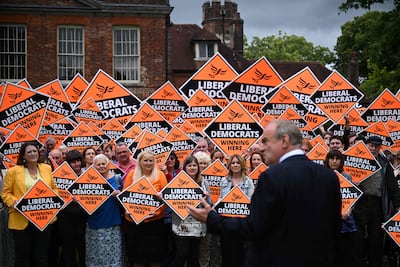Live updates: Follow the latest news on the UK general election
People from Britain who live abroad have been offered the prospect of greater representation in the UK through the suggestion of constituencies for overseas voters, but the plan has some way to go before it wins over many in the UAE.
The Liberal Democrats, led by Ed Davey, want British citizens to have their own MPs to represent them in Parliament.
Those living abroad who are registered can vote in general elections but their ballot applies to the last place in which they lived in the UK.
The Liberal Democrats want to change that and follow France, Italy, Portugal and Croatia, all of which have separate representatives for overseas voters.
George Cunningham, chairman of the Steering Committee of Lib Dems Abroad, told The National: “The local MP is not really focused on the issues of people abroad, because it’s such a small proportion of constituents.
“So they rarely deal with them and therefore they cannot adequately serve them.”
He said MPs would address specific issues affecting expats, such as frozen state pensions, which do not increase annually in line with those collected in the UK.
Mr Cunningham said the issue affects half a million pensioners living overseas.
“You have people living on a quarter of the pension that’s being received at home, if they are quite elderly,” he added.
Up to three million long-term overseas' residents are eligible to vote for the first time in Thursday’s election following a change in the law.
Part of the UK government's Election Act 2022, the change means citizens who have lived abroad for more than 15 years but have either previously lived in or been registered to vote in Britain are now permitted to vote.
They include long-term UAE expat, Jennifer Brown, a Scot living in Abu Dhabi, who said the idea of overseas constituencies was “interesting in principle”.
“Long-term expats have been disenfranchised and disengaged for years, partly due to not being able to engage with the government," she said.
“Perhaps this would enable more engaged expats? If so, I think it would lead to a positive outcome.”
Keren Bobker, administrator of the British Expats Dubai and UAE Facebook page, and a columnist for The National, who is also voting for the first time in years following the change in law, said it was probably not a priority for many voters, even those overseas.
“I’d like to think that many of us will vote for the greater good, not just for self-interest, so our votes will be about more than what works for us as non-residents.

“How different are our views to those of UK residents, especially for those who plan to return one day?”
Polls suggest the Labour Party is on course for a return to power for the first time since 2010 with an overwhelming majority.
That outcome would see Britain swing leftwards back to the centre ground after almost a decade and a half of right-wing Conservative governments.
Labour has enjoyed a consistent 20-point lead in the polls over the past two years, with many voters dissatisfied at the Conservatives' handling of a range of issues including the cost of living, public services, immigration and the economy.
But on Tuesday former prime minister Boris Johnson – who was ousted by his own colleagues, including current Prime Minister Rishi Sunak, in 2022 after a string of scandals, and who has been notably absent from the campaign – urged supporters not to see the result as a "foregone conclusion".
UK general election campaigning - in pictures
The Brexit stalwart told a rally late on Tuesday that Labour leader Keir Starmer would try to "usher in the most left-wing Labour government" since the Second World War.
Earlier, Survation pollsters predicted Labour was on track for more than the 418 seats it won when Tony Blair ended 18 years of Conservative rule in 1997.
Labour requires at least 326 seats to secure a majority.



























































































